Kinetic modeling for radical polymerization and depolymerization
IF 6.8
2区 工程技术
Q1 BIOTECHNOLOGY & APPLIED MICROBIOLOGY
引用次数: 0
Abstract
Radical polymerization and its reverse process, radical depolymerization, are central to modern polymer manufacturing and recycling strategies. This review highlights recent advances in understanding the mechanisms and modeling techniques. Enhanced deterministic and stochastic models have successfully described the complexities of radical polymerization processes. Parallel breakthroughs in radical depolymerization kinetics, particularly through end-group-assisted unzipping and visible-light activation, have facilitated efficient monomer recovery under milder reaction conditions. Additionally, advanced modeling leveraging quantum chemistry and machine learning and experimental validations has significantly boosted predictive accuracy. By integrating state-of-the-art kinetic modeling with sustainable design principles, researchers are progressively establishing foundations for closed-loop polymer lifecycles.
自由基聚合与解聚的动力学模型
自由基聚合及其逆向过程自由基解聚是现代聚合物制造和回收策略的核心。这篇综述强调了在理解机制和建模技术方面的最新进展。增强的确定性和随机模型已经成功地描述了自由基聚合过程的复杂性。自由基解聚动力学的平行突破,特别是通过端基辅助解聚和可见光活化,促进了在较温和的反应条件下高效的单体回收。此外,利用量子化学、机器学习和实验验证的先进建模大大提高了预测的准确性。通过将最先进的动力学建模与可持续设计原则相结合,研究人员正在逐步建立闭环聚合物生命周期的基础。
本文章由计算机程序翻译,如有差异,请以英文原文为准。
求助全文
约1分钟内获得全文
求助全文
来源期刊

Current Opinion in Chemical Engineering
BIOTECHNOLOGY & APPLIED MICROBIOLOGYENGINE-ENGINEERING, CHEMICAL
CiteScore
12.80
自引率
3.00%
发文量
114
期刊介绍:
Current Opinion in Chemical Engineering is devoted to bringing forth short and focused review articles written by experts on current advances in different areas of chemical engineering. Only invited review articles will be published.
The goals of each review article in Current Opinion in Chemical Engineering are:
1. To acquaint the reader/researcher with the most important recent papers in the given topic.
2. To provide the reader with the views/opinions of the expert in each topic.
The reviews are short (about 2500 words or 5-10 printed pages with figures) and serve as an invaluable source of information for researchers, teachers, professionals and students. The reviews also aim to stimulate exchange of ideas among experts.
Themed sections:
Each review will focus on particular aspects of one of the following themed sections of chemical engineering:
1. Nanotechnology
2. Energy and environmental engineering
3. Biotechnology and bioprocess engineering
4. Biological engineering (covering tissue engineering, regenerative medicine, drug delivery)
5. Separation engineering (covering membrane technologies, adsorbents, desalination, distillation etc.)
6. Materials engineering (covering biomaterials, inorganic especially ceramic materials, nanostructured materials).
7. Process systems engineering
8. Reaction engineering and catalysis.
 求助内容:
求助内容: 应助结果提醒方式:
应助结果提醒方式:


